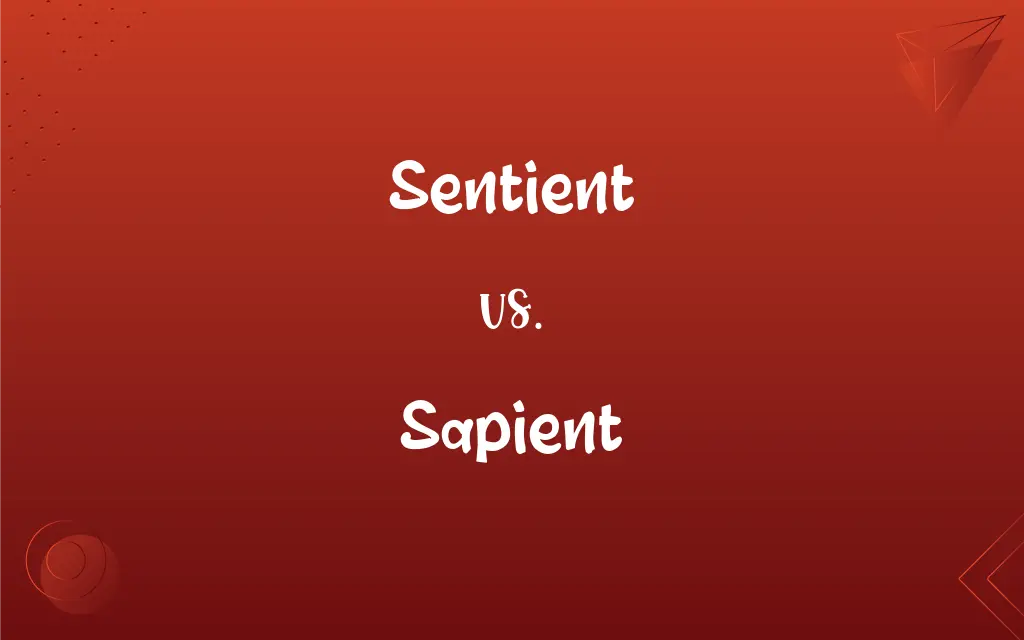Sentient vs. Sapient: What's the Difference?
Edited by Aimie Carlson || By Janet White || Published on January 11, 2024
Sentient refers to the ability to perceive or feel things, while sapient denotes wisdom or intelligence.

Key Differences
Sentient beings have the capacity to experience sensations and feelings, such as pain or pleasure. Sapient beings, on the other hand, possess higher intellectual abilities and can apply knowledge and wisdom in various situations.
The concept of sentience primarily focuses on the aspect of consciousness and the ability to have subjective experiences. Sapience, however, emphasizes the aspect of cognition, particularly the capacity for judgment and understanding.
Animals are often considered sentient as they can feel and react to their environments. Humans are both sentient and sapient, capable of feeling and also exercising judgment and wisdom.
In science fiction, a sentient robot might be able to sense its surroundings and react accordingly, while a sapient robot would be able to think, learn, and make complex decisions.
The ethical considerations for sentient beings revolve around their ability to suffer or experience happiness, whereas for sapient beings, these considerations might extend to their rights to knowledge, freedom of thought, and self-determination.
ADVERTISEMENT
Comparison Chart
Primary Attribute
Ability to feel or perceive.
Ability to think and reason.
Associated With
Consciousness and experiences.
Intelligence and wisdom.
Examples
Animals reacting to stimuli.
Humans making informed decisions.
Ethical Considerations
Welfare and prevention of suffering.
Rights to knowledge and self-determination.
In Fiction
Robots sensing their environment.
Robots making complex decisions.
ADVERTISEMENT
Sentient and Sapient Definitions
Sentient
Capable of feeling or perceiving.
The sentient dog whimpered in pain.
Sapient
Characterized by wisdom, especially of a philosophical or ethical nature.
His sapient advice often resolved complex dilemmas.
Sentient
Responsive to or conscious of sensory impressions.
The sentient plant closed its leaves when touched.
Sapient
Possessing or expressing great wisdom or sound judgment.
The sapient leader made decisions after careful consideration.
Sentient
Having subjective experiences or feelings.
Sentient beings like dolphins exhibit complex emotions.
Sapient
Having or showing deep understanding and intelligent application of knowledge.
The sapient professor's lectures were enlightening.
Sentient
Possessing the power of sensation or sensory perception.
The sentient creature reacted to the sudden darkness.
Sapient
Acutely insightful and wise, often implying a higher perspective.
The sapient judge was respected for her fair rulings.
Sentient
Able to perceive or feel things through the senses.
The sentient AI responded to the user's voice commands.
Sapient
Having keen mental discernment, often in a scholarly context.
The sapient scholar contributed significantly to the field of ethics.
Sentient
Having sense perception; conscious
"The living knew themselves just sentient puppets on God's stage" (T.E. Lawrence).
Sapient
Having great wisdom and discernment.
Sentient
Experiencing sensation or feeling.
Sapient
Attempting to appear wise or discerning.
Sentient
Experiencing sensation, thought, or feeling.
Sapient
(dated) Possessing wisdom and discernment; wise, learned.
Sentient
Able to consciously perceive through the use of sense faculties.
Sapient
Of a species or life-form, possessing intelligence or self-awareness.
Sentient
Possessing human-like awareness and intelligence.
Sapient
An intelligent, self-aware being.
Sentient
Lifeform with the capability to feel sensation, such as pain.
Sapient
Wise; sage; discerning; - often in irony or contempt.
Where the sapient kingHeld dalliance with his fair Egyptian spouse.
Sentient
An intelligent, self-aware being.
Sapient
Acutely insightful and wise;
Much too perspicacious to be taken in by such a spurious argument
Observant and thoughtful, he was given to asking sagacious questions
A source of valuable insights and sapient advice to educators
Sentient
Having a faculty, or faculties, of sensation and perception.
Sentient
One who has the faculty of perception; a sentient being.
Sentient
Endowed with feeling and unstructured consciousness;
The living knew themselves just sentient puppets on God's stage
Sentient
Consciously perceiving;
Sentient of the intolerable load
A boy so sentient of his surroundings
FAQs
Is sapience unique to humans?
In the current understanding, sapience, especially in terms of complex thought and reasoning, is largely attributed to humans.
Is empathy a sign of sentience?
Empathy can be a manifestation of sentience, especially in recognizing and reacting to the emotions of others.
Are all living things sentient?
Not all; sentience typically implies some level of consciousness or ability to feel, which may not be present in simpler life forms.
Can plants be considered sentient?
While plants respond to stimuli, they lack the nervous system and brain to experience sentience as animals do.
What is sapience?
Sapience is the quality of having great wisdom and sound judgment.
Can an entity be sentient but not sapient?
Yes, many animals are sentient as they can feel, but not necessarily sapient.
Does sapience imply morality?
Sapience involves judgment and wisdom, which often includes moral and ethical considerations.
What does sentient mean?
Sentient means having the ability to feel or perceive things.
Is creativity a feature of sapience?
Creativity can be seen as a feature of sapience, particularly in the context of problem-solving and artistic expression.
Can AI achieve sapience?
While AI can mimic aspects of sapience, achieving true sapience like humans is still a subject of debate and research.
Is wisdom the same as intelligence?
Not exactly; wisdom (sapience) involves the judicious application of knowledge, while intelligence is more about the capacity to learn and understand.
Is logical thinking a sign of sapience?
Yes, logical thinking and reasoning are integral parts of sapience.
Does sapience include emotional intelligence?
Sapience primarily involves cognitive abilities, but it can encompass emotional intelligence as part of wisdom.
Are computers or AI sentient?
Currently, computers and AI lack true sentience as they do not have subjective experiences or consciousness.
Are emotions a part of sentience?
Yes, emotions are considered a key aspect of sentience, as they are part of experiencing and feeling.
Can sentient beings be non-living?
Typically, sentience is associated with living beings, though some theories in science fiction explore sentience in non-living entities.
Do sentient beings have rights?
Many argue that sentient beings have certain rights, especially regarding welfare and freedom from suffering.
Can sapience be lost?
Sapience can be affected by various factors like disease or injury, impacting cognitive functions and wisdom.
How is sentience measured?
Sentience is challenging to measure directly and is often inferred from behavior and the presence of a nervous system.
Does sapience evolve?
Sapience, as seen in humans, has evolved over time, becoming more complex and sophisticated.
About Author
Written by
Janet WhiteJanet White has been an esteemed writer and blogger for Difference Wiki. Holding a Master's degree in Science and Medical Journalism from the prestigious Boston University, she has consistently demonstrated her expertise and passion for her field. When she's not immersed in her work, Janet relishes her time exercising, delving into a good book, and cherishing moments with friends and family.
Edited by
Aimie CarlsonAimie Carlson, holding a master's degree in English literature, is a fervent English language enthusiast. She lends her writing talents to Difference Wiki, a prominent website that specializes in comparisons, offering readers insightful analyses that both captivate and inform.































































